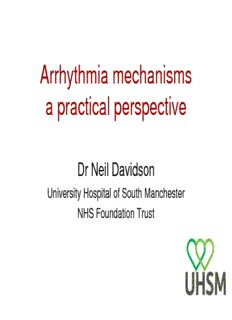
Arrhythmia Mechanisms PDF
Preview Arrhythmia Mechanisms
Arrhythmia mechanisms a practical perspective Dr Neil Davidson University Hospital of South Manchester NHS Foundation Trust Arrhythmia mechanisms • Automatic • Re-entrant – Micro – Macro • Triggered automaticity • Phase 4 re-entry • Delayed afer depolarisations • Early after depolarisations “Automatic” Arrhythmias • Focal • Atrial, ventricular (or r • arely junctional) • Usually start and stop spontaneously (not with programmed stimulation) • May show “warm up” • Typically catecholamine-dependent • Respond to beta blodkers • Mapping techniques Earliest activation Pace map Typical sites of “automatic” atrial tachycardia (1) Pulmonary Vens (2) Prox CS (3) Tricuspid annulus (4) Mitral annulus 1 (5) Atrial septum 1 5 (“para-His”) 4 2 3 3 Example 1 46 yr old woman, normal heart LAO RAO Mitral Annular tachycardia – activation mapping Example 2 16 year old girl referred fpr heart transplant Tricuspid annular tach causing tachymyopathy istinctive P wave deeply negative V1-3 D Example 3 19 yr old male Left atrial appendage tachycardia (rare) Example 4 2:1 AV block, early local atrial signal in coronary sinus Example 4 Ligament of Marshall tachycardia CS anatomy - no obvious Vein of Marshall RAO LAO
Description: